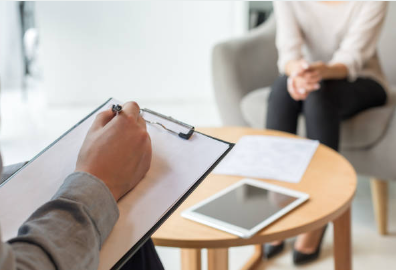Self-Help Psychology
Academic psychology usually ignores the self-help genre, leaving it up to the public to decide how to apply psychological knowledge to their own lives. Authors and publishers of self-help books have a vested interest in selling as many copies as possible, so they are never required to put warnings or contraindications on the cover.

Selfpause Affirmation App
Download the app to get 1,000’s of affirmation meditations and everything you need to write, record and listen to your own.
Bibliotherapy

Bibliotherapy for self-help psychology is a treatment method based on reading. It is a form of alternative learning for clients and can help speed up therapy and boost motivation. It can also help address secondary concerns and is a relapse prevention technique. Although there is limited research to determine the effectiveness of bibliotherapy, there are many benefits that make it a valuable adjunct to therapy.
For example, literature can help people cope with stressful life situations and transition through milestones in their lives. In addition, it can help people understand and experience emotions through fictional characters. Bibliotherapy is a good choice for individuals who are dealing with depression, anxiety, self-destructive behaviors, or even chronic health conditions.
To evaluate bibliotherapy for self-help psychology, researchers looked for research that compared it with psychotherapy. The research used a variety of self-help books to treat a variety of psychiatric conditions, such as depression and anxiety. The study included both children and adults. Children were able to participate in the treatment with or without their parents. The researchers used random-effect models to evaluate the efficacy of the interventions.
Bibliotherapy is also called prescriptive bibliotherapy and uses specific reading materials and workbooks to treat a particular mental health condition. It is a common practice in mental health practitioners’ practices. For instance, cognitive behavioral therapists often incorporate self-help bibliotherapy into their work.
Although there is limited research to support the efficacy of bibliotherapy, it is believed to be a cost-effective treatment for many mental health issues. Studies suggest that it is an effective treatment method for clients with alcohol and drug concerns. Furthermore, the benefits of bibliotherapy extend beyond addiction treatment.
Effectiveness

The effectiveness of self-help psychology for anxiety and depression has been the subject of a number of studies. In a meta-analysis, Gould and colleagues reviewed 40 studies and found that the effects were moderate to large. The researchers used the standardized mean difference (SMD) method to estimate effect sizes. This method involves subtracting the experimental group’s mean from the control group’s mean and dividing by the pooled standard deviation. They also used other indices to measure effect sizes. In addition, the study participants were interviewed by two female researchers with backgrounds in psychology and epidemiology, and both had experience with qualitative research. The interviews were audio-recorded and verbatim. The researchers removed participant identifiers from the transcripts, except where a study participant was identified.
The most popular books on psychology are not necessarily problem-oriented; rather, growth-oriented books dominate. In fact, only one of the top 57 best-selling books deals with overcoming depression. The list of psychology bestsellers also does not include books on overcoming anxiety disorders and addiction. In addition to general bookstores, many clients’ organizations and mental health professionals distribute self-help books.
The relationship between a client and psychotherapist is a critical factor in the effectiveness of therapy. In contrast, this relationship is absent in self-help psychology. Moreover, in traditional psychotherapy, the role of the psychotherapist is explicitly mentioned. A psychotherapist may choose clients and treatments for an individual, and this choice may determine the success of a treatment.
Although the effectiveness of self-help psychology is not proven, there are some studies which have found that this approach is effective for many people. In fact, researchers have found that self-help psychology is effective for the prevention of mental disorders and for the improvement of general well-being. Self-help psychology can help people overcome anxiety and depression, and can be a public health strategy.
Challenges

Self-help programs can be an effective means of treating mental health conditions. However, they are not without their own challenges. These include choosing the right self-help app, limited contextualization, and motivation management. Despite these challenges, they serve important purposes. This article explores the issues involved and proposes recommendations for effective self-help psychology interventions.
Many psychologists recommend the use of self-help resources to complement psychotherapy. For example, research suggests that consumers of self-help books show higher depressive symptoms. In addition, a study published in Neural Plasticity indicates that consumers of these books are more sensitive to stress. For these reasons, self-help resources are important tools for dealing with stress and depression.
Future studies should evaluate the effectiveness of self-help strategies. They should also consider the underlying motivations of clients and explore possible links between self-help strategies and their effectiveness. This will help mental health professionals better understand these strategies. It may also prove useful for supplementing ongoing psychotherapy. If successful, self-help strategies could become an integral part of a client’s treatment.
One of the main challenges of self-help is that the advice offered by the self-help products is not always reliable. The advice contained in these products is often superficial and untested. It may also be boring and not backed up by empirical evidence. Moreover, some self-help products are over-sold and have misleading mission statements.
Methods

Self-help psychology is a natural way for people to work through a variety of problems. It is as common as breathing, and everyone engages in self-help behavior to varying degrees. Self-help psychology is not meant to replace therapy, but rather to help people overcome difficulties and make better decisions.
Self-help psychology refers to a variety of strategies for dealing with mental health problems. These strategies may be initiated by the individual or may be acquired through learning materials. They may also be used in conjunction with professional help. Examples include attending support groups, practicing meditation, and using online health resources. Although they are not a substitute for professional help, they are less invasive and often less stigmatizing than other services.
Although self-help psychology is a viable option for people experiencing everyday difficulties, there are risks associated with it. While most legitimate self-help resources are evidence-based and scientifically validated, there are also books that inspire people but do not provide any practical solutions. In fact, some of these books can actually create more frustration than benefit.
Our Top FAQ's
Some common psychological barriers to self-improvement include low self-esteem, negative self-talk, procrastination, and fear of failure. These barriers can be overcome by setting realistic goals, using positive affirmations, breaking tasks down into manageable chunks, and seeking support from others.
Self-help psychology techniques can be used to improve mental health and well-being by promoting positive thinking, increasing self-awareness, and providing tools for managing difficult emotions and situations. These techniques can include mindfulness practices, cognitive-behavioral therapy (CBT) techniques, and stress-reduction techniques such as relaxation techniques and exercise.
Self-help psychology techniques can be incorporated into a daily routine by setting aside time each day to practice techniques such as meditation or journaling, or by setting goals and tracking progress towards those goals. It can also be helpful to enlist the support of friends or a therapist to help stay on track.
Some effective strategies for setting and achieving personal goals in the context of self-help psychology include setting specific, measurable, achievable, relevant, and time-bound (SMART) goals, creating a plan to achieve those goals, and tracking progress along the way. It can also be helpful to enlist the support of others and to be flexible and adaptable in the face of setbacks or challenges.
Self-help psychology can be used to build resilience and cope with stress and adversity by teaching skills such as problem-solving, stress management, and positive thinking. These skills can help individuals to better manage difficult situations and bounce back from setbacks, and can be developed through self-help techniques such as CBT and mindfulness practices.
